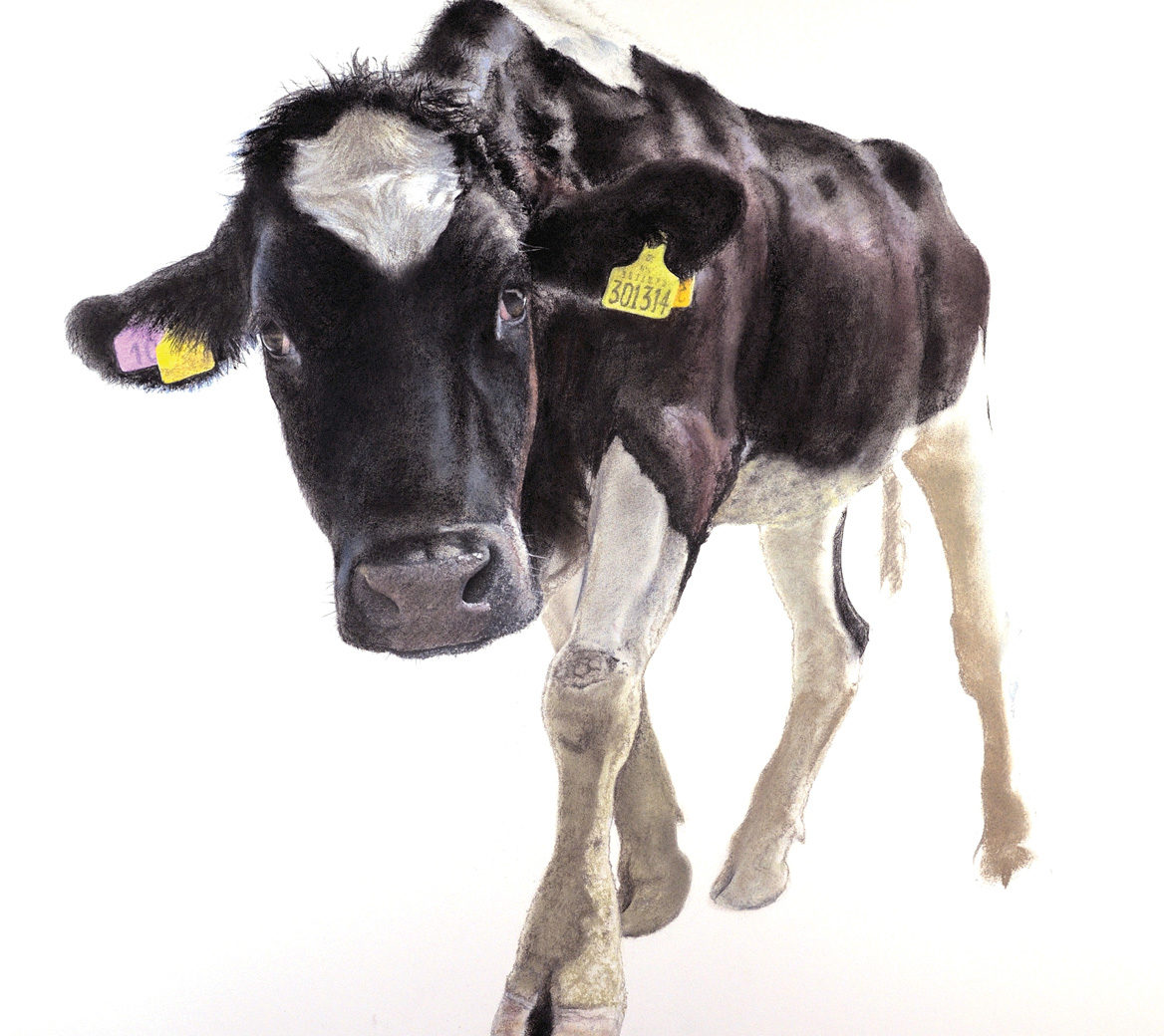‘Animals With Attitude’ At Duck Creek

RJT Haynes should consider himself unusual. Starting Saturday, August 3, and running for three weekends thereafter, “Toby,” as he’s familiarly called, will have that rarity of rarities on the East End — at the height of the season, yet — a one-man show. It will be at the Arts Center at Duck Creek in Springs.
The U.K.-born-and-bred figurative and representational artist could also claim recognition for what’s now become signature subject matter — farm animals, particularly sheep and cows (pastels, watercolors, oils). If you chat him up and don’t get sidelined by his quirky humor and deadpan wit, you may find out why (or not).
Haynes owns up that the title of the exhibit, “Mugshots,” is “mischievous.” But, as viewers will see, he can also create lovely, limited-palette compositions of coastal areas and, at times, illustrate a young woman charmingly caught at various domestic chores.
There’s also going to be a bonus in the exhibit — a selection of Haynes’s poetry, sometimes related to an art work, sometimes not, but reflective of his belief that “words and images cross-pollinate in unpredictable ways.”
When he’s not working in East Hampton or in the city, Toby Haynes lives part of the year in a remote cottage in Cornwall, where his neighbors are mostly animals, and where he once went for 17 years without electricity, an experience that made him “more attuned to seasons, climate, the quality of light, and atmosphere.”
His animals have attitude — their own and his. Neither sweet nor symbolic, they ironically dare us to be nostalgic for a time and place most of us have probably never known. Beautifully painted or drawn, their quiet, sturdy presences curiously prompt thoughts about their care, their owners, their destiny as livestock. “I’m not so much interested in fleeting impressions,” the artist said, “as in what’s underneath them; everything we see is full of cultural and personal references.”
“Materials and subject have a say in what becomes of them,” he added, and painting is “always a form of negotiation or collaboration between us.” By “us” he means not only himself and the animals, but also any inanimate objects that may catch his fancy to be fixed on canvas: a colored-pencil drawing of a vintage workbox, for example, that belonged to his father, a sign painter who introduced the artist to the smell of paint and turpentine. Or a mixed-media drawing of an old suitcase that incorporates the owner’s initials in gold leaf, taken from the case itself.
“I’ve always loved the alchemy of line and color, and hunting for the spark that ignites an image,” he said. But he will change his technique or palette “if everything starts to feel too familiar and comfortable.” And he does, leaving the sheep and cows for a figure seen in an everyday pose, sometimes as through a mesh screen.
But oh, those sheep and cows! He’s intrigued, he writes, by their “edgy ambivalence” as farm property enhanced with a suggestion of “theriomorphism.”
Haynes’s resume evidences many award-winning invitational and juried shows in the U.K., the U.S., and Europe, but before that, he worked for several years “on real pick and shovel projects” for Britain’s largest conservation charity, the National Trust, and also studied German and philosophy at Oxford. In other words, his playful, offhand invocation of literary references draws on a substantial live stock (so to speak) of intellectual source material.
Duck Creek’s historic barn, with its gorgeous vaulted wood ceiling and wooden walls, seems a natural fit for Haynes and for community artists of all genres. Originally an 18th-Century homestead that included a farmhouse belonging to the Edwards family (original settlers of the Maidstone Colony), the site was bought by East Hampton Town in 2006, and with the generous support of the Willem de Kooning Foundation, the HILO Foundation, and a growing number of local individuals, became a free, open-to-the-public, not-for-profit corporation licensed by the town, with a mission to “perpetuate the goals and the spirit of artist John Little,” the late abstract expressionist and fabric designer who purchased a parcel of the original farm in 1948. The center is open between May 1 and October 31.
“Mugshots,” paintings, drawings, and poetry by RJT Haynes will be on view at Duck Creek Farm, 127 Squaw Road, East Hampton, from August 3 (opening reception) to August 25 on Fridays, Saturdays, and Sundays, or by appointment.



